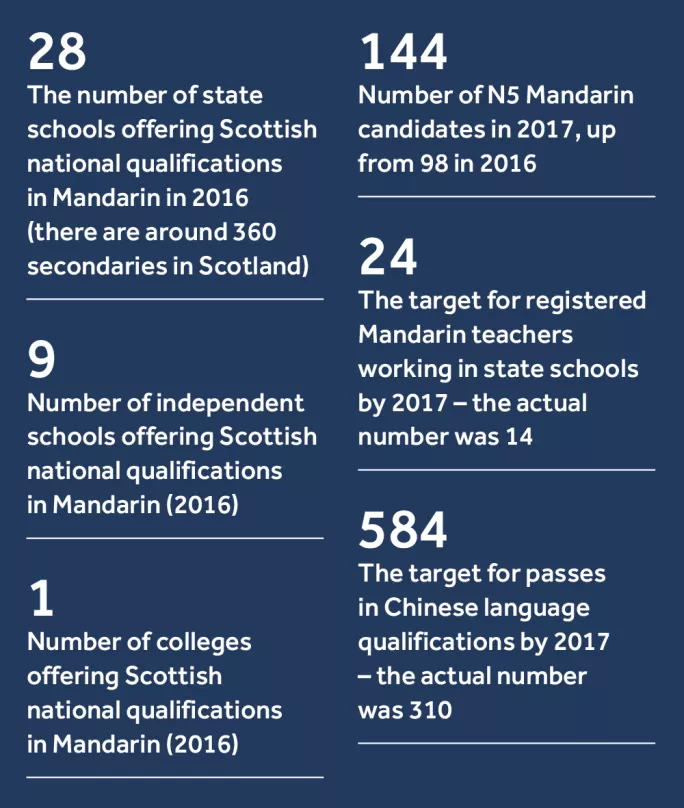‘The future’s still Mandarin’ despite lack of interest

It is just over a decade since Scotland began training its first Mandarin teachers.
But with uptake of the subject low, and teacher numbers falling well short of government targets, what does the future hold for Mandarin teaching in this country?
The number gaining the top grade in the subject has fallen at National 5. But this could just reflect the fact that, as a language grows in popularity, a smaller proportion of learners will be native speakers, according to Robert Quinn, from exams body the Scottish Qualifications Authority (SQA). “Sometimes people think that when the pass rate is down, that’s bad - but not necessarily in the context of Chinese,” says Quinn, SQA’s head of English, languages, business and core skills.
Scotland began training teachers to deliver Mandarin in 2007, with students able to sit exams for the first time in 2009.
The proportion of pupils achieving an A grade for Mandarin dropped last year at N5, from 74.5 per cent in 2016 to 68.8 per cent. However, uptake had increased by around 50 per cent, rising from 98 candidates in 2016 to 144 in 2017.

Now, the majority of students studying the subject at N5 are “true learners”, says Quinn. If you want a language to grow, it is these non-heritage speakers whom you need to get on board, he adds. However, they tend not to perform as well in the exam. “You get a spread of marks, instead of them all being at the top end,” he says.
On the current state of Mandarin learning in Scotland, Quinn adds: “There are some green shoots, but we have to keep going.”
Despite his optimism, the subject has not taken off in schools in the way the Scottish government had hoped.
The push to introduce the language began with the publication of Scotland’s Strategy for Stronger Engagement with China in 2006. The strategy contained a 10-point plan, of which one of the targets was to have “at least 200 pupils studying for Chinese language national qualifications in Scottish schools by 2010”. Quinn says those early targets were hit.
But the targets in the government’s latest China plan - a five-year strategy published in December 2012 - have been roundly missed.
The plan set out to double the number of teachers of Mandarin working in local authority schools in Scotland, as well as the number of pupils attaining Chinese language qualifications, based on 2011-12 levels.
Lack of teachers
The SNP is not alone in struggling to embed Mandarin in schools; in England, the Conservative government is also grappling with this. As in Scotland, a major problem is a shortage of Mandarin teachers.
However, the Scottish government is keen to point out that there are now three universities offering secondary PGDE Mandarin courses. A government spokesman says there are also 47 “Hanban” teachers, who are sponsored by the Chinese government and work alongside teachers in Scottish schools.
“Building teacher capacity and increasing attainment in recognised qualifications in Chinese languages will take time but as the pace of implementation of the 1+2 language policy gathers, we expect to see both grow,” a spokesman adds.
“We will continue to work towards increasing the number of General Teaching Council for Scotland-registered Mandarin teachers.”
To date, the University of Edinburgh - the first teacher education institution in Scotland to train Mandarin teachers - has produced around 40 staff.
Michael Lynch, senior lecturer in languages at the university, says: “Although 10 years seems like a long time, it’s not really, in the grand scheme of things. The main challenge for schools is sustainability. At the moment, if a Mandarin teacher leaves, the school has lost the language.”
Retention of Mandarin teachers is a particularly acute issue for state schools. Teachers often view the independent sector as more prestigious, and move to jobs there. They can also move into the further and higher education sectors.
However, Quinn argues that the perception that it is mainly independent schools delivering Mandarin is becoming outdated.
Celebrating the positives
In 2016, there were 326 candidate entries for Scottish national qualifications in Chinese. The qualifications were taken in 38 different centres - 28 state schools, nine independent schools and one college. And there are other positives to celebrate, say Quinn and his colleague Jim McDonald, the qualifications manager responsible for Chinese at the SQA.
They point to the existence of the Confucius Institute for Scotland’s Schools, based at the University of Strathclyde, and the Scotland China Education Network - both of which are dedicated to promoting Chinese language and culture in schools. Mandarin has had to overcome a perception that it is “exotic and difficult”, says McDonald, and these organisations have “helped schools to feel enough confidence to bring Chinese in”.
Judith McClure, a former headteacher who chairs the Scotland China Education Network, highlights the growing importance of the language, while acknowledging the challenges that lie ahead.
“When we evaluate our progress, we want much more,” she says.
“Clearly, after only 11 years, we must not be dejected by the limited uptake of qualifications and registered teachers.
“We need to keep up our enthusiasm for the development of a language and a cultural understanding of vital importance to the future of the world and the careers of our young people.”
You need a Tes subscription to read this article
Subscribe now to read this article and get other subscriber-only content:
- Unlimited access to all Tes magazine content
- Exclusive subscriber-only stories
- Award-winning email newsletters
Already a subscriber? Log in
You need a subscription to read this article
Subscribe now to read this article and get other subscriber-only content, including:
- Unlimited access to all Tes magazine content
- Exclusive subscriber-only stories
- Award-winning email newsletters